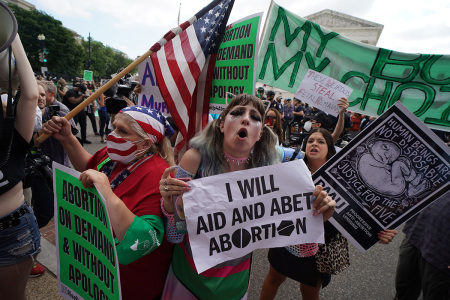Arkansas AG certifies abortion ballot initiative after rejecting it twice

Arkansas Attorney General Tim Griffin certified a referendum proposal that, if passed, would guarantee a limited right to an abortion, provided supporters can garner enough signatures to get it on the ballot.
In an opinion issued Tuesday, Griffin greenlit pro-choice supporters to get signatures for the Arkansas Abortion Amendment of 2024, having previously rejected the proposal twice for assorted technical reasons, which have since been rectified.
While approving the referendum, Griffin, a Republican, gave "a cautionary note" to the petitioners, noting that "experience has shown a correlation between the length and complexity of initiated measures and their susceptibility to a successful ballot-title challenge."
"Any ambiguity in the text of a measure could lead to a successful court challenge. Significant changes in law often have unintended consequences that, if known, would give voters serious ground for reflection," stated Griffin.
Arkansans for Limited Government, the group behind the proposed amendment, noted in a statement Wednesday that the next step in its efforts will be to gather enough signatures from state voters, with the official kickoff for the effort being on Sunday.
"AFLG invites Arkansans across the state and political spectrum to come together and restore reproductive rights in Arkansas," stated the group. "Everyone is encouraged to volunteer for signature collection and donate to the campaign."
"This is a crucial step forward in restoring reproductive freedom for Arkansans. AFLG is especially grateful to the AG's staff, whose professionalism and expertise emblematizes true public service."
The proposed amendment seeks to legalize abortion for up to 18 weeks after conception or under special circumstances, including rape, incest, a diagnosed fatal fetal anomaly or if the mother is facing a life-threatening emergency.
The Arkansas Family Council President Jerry Cox, whose organization is based in Little Rock, said in a statement that the proposed measure was "a radical amendment legalizing abortion in a way Arkansas has never seen before."
"It writes abortion into the Arkansas Constitution. It erases virtually all of Arkansas' pro-life laws, and it allows abortion on demand without restriction through the first eighteen weeks of pregnancy," Cox said.
"As many as three thousand unborn children could be aborted in Arkansas each year because of this amendment, and the State of Arkansas would be powerless to prevent it."
Arkansas law prohibits abortion unless it is necessary to save the life of the mother, and the state constitution does not put any limits on the state government to restrict abortion access.
Griffin twice refused to certify the proposed amendment due to issues regarding the measure's language, arguing that certain phrases were too partisan or poorly defined.
In a letter outlining his second rejection, Griffin had said that the way the proposed amendment had misleadingly defined the term "physical health."
The amendment language at the time had defined "physical health" as "a physical disorder, physical illness, or physical injury … caused by or arising from the pregnancy itself, or when continuation of the pregnancy will create a serious risk of substantial impairment of a major bodily function."
"It defines 'physical health,' not as the absence of disorder, illness, or injury, but as the presence of those things," wrote Griffin. "That is the opposite of the common meaning of 'health.'"
"I suspect you intended something like this: to permit 'abortion services' when, among other things, they 'are needed to protect the pregnant female from a physical disorder, physical illness, or physical injury.'"





















